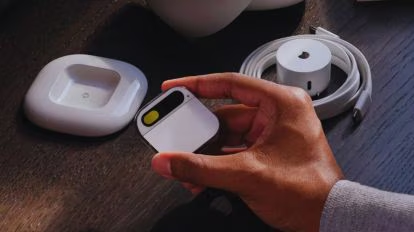Microsoft Zune, the Apple Newton, and the Amazon Fire Phone have one thing in common — they all made the technology product flop list. It appears that there’s a new entrant about to join this list: the Humane AI Pin.
According to The New York Times, only 10,000 units of the heavily criticized $699 AI gadget have been sold since it was released earlier this year. The company’s target was 100,000. The result? Rumors suggest that the Humane team is trying to sell its business to HP for a grand total of $1 billion.
The Humane AI Pin is a wearable “ambient” computer designed to be attached to clothes with a magnet. It offers users a virtual assistant to answer questions and provide smart filtering based on the wearer’s preferences. Due to its hands-free interaction, the Humane AI Pin was intended to eventually replace smartphones.
Upon its release, the Humane AI Pin received mostly bad reviews. In May, the first news leaked that the company behind the product was hoping to be sold. Then, on Wednesday, Humane told its AI Pin device owners to stop using its charging case “immediately” because it “may pose a fire safety risk.”

The latest report indicates that Humane is in discussions with multiple companies, not just HP, regarding a potential acquisition. These discussions have been ongoing since the initial reviews were released. Despite all this doom and gloom, the creators behind the Humane AI Pin remain positive, although they won’t comment on any possible sale.
Former Apple employees Bethany Bongiorno and Imran Chaudhri reiterated their unwavering commitment to their vision for the AI Pin. However, they also candidly acknowledged the difference between testing and using a device. According to Bongiorno: “You don’t know everything before you launch.” Chaudhri added: “They definitely wish that we were able to resolve some of those things a little bit differently.”
The Humane AI Pin was conceived as a revolutionary product, promising to redefine how users interact with technology. Its unique design aimed to liberate users from their smartphones, offering a more natural and integrated experience. However, reality has not matched expectations. The device’s poor sales and negative reception highlight significant flaws in its execution and market readiness.
The fire risk associated with the charging case has further tarnished the AI Pin’s reputation. Safety concerns are a critical issue for any tech product, and this setback underscores the challenges Humane faces in maintaining consumer trust and product reliability. As Humane navigates these turbulent waters, the broader tech industry watches closely. The potential acquisition talks suggest that while the AI Pin itself may be struggling, the underlying technology and vision still hold some value.

For companies like HP, acquiring Humane could offer an opportunity to integrate innovative AI and wearable technologies into their own product lines, potentially salvaging some of the original vision. For now, the Humane AI Pin stands as a cautionary tale in the tech world. It reminds innovators and companies alike of the unpredictable nature of consumer markets and the critical importance of thorough testing and readiness before launch. The journey of the AI Pin underscores the fine line between visionary innovation and practical execution.
In summary, the Humane AI Pin’s troubled journey from a promising concept to a struggling product highlights the challenges of introducing groundbreaking technology. Despite the setbacks, the determination of its creators and the ongoing acquisition discussions suggest that the story of the Humane AI Pin is not yet over. Whether it will ultimately succeed or join the ranks of infamous tech flops remains to be seen.
The Humane AI Pin’s development, marked by ambitious goals and innovative ideas, is a classic example of the risks inherent in pioneering new technology. The transition from concept to market is fraught with obstacles, and even the most well-intentioned projects can falter under the weight of real-world challenges. The initial excitement surrounding the AI Pin’s potential to replace smartphones has been overshadowed by practical issues that have eroded consumer confidence.
As the tech community continues to monitor Humane’s efforts to resolve these issues, there is a broader lesson to be learned about the importance of resilience and adaptability in the face of setbacks. The willingness of Bongiorno and Chaudhri to acknowledge and address the device’s shortcomings reflects a commitment to continuous improvement, which is crucial for long-term success in the fast-paced tech industry.

Ultimately, the future of the Humane AI Pin will depend on the company’s ability to learn from its mistakes and adapt its strategy accordingly. The ongoing discussions about a potential acquisition highlight the value of collaboration and the potential for synergy between different tech innovators. Whether Humane finds a new home with HP or another company, the AI Pin’s journey offers valuable insights into the complexities of bringing cutting-edge technology to market.
If you like the article please follow on THE UBJ.

